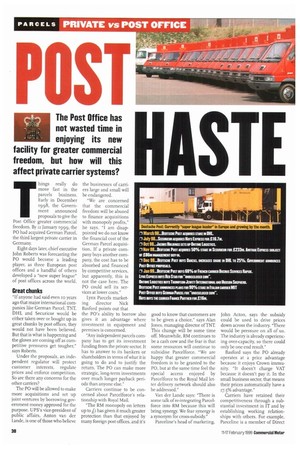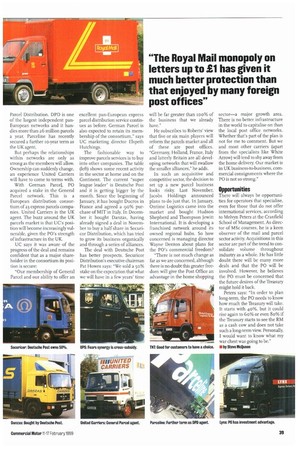II ST E
Page 40

Page 41

If you've noticed an error in this article please click here to report it so we can fix it.
The Post Office has not wasted time in enjoying its new facility for greater commercial freedom, but how will this affect private carrier systems?
Things really do move fast in the parcels business. Early in December 1998, the Government announced proposals to give the Post Office greater commercial freedom. By ii January 1999, the PO had acquired German Parcel, the third largest private carrier in Germany.
Eight days later, chief executive John Roberts was forecasting the PO would become a leading player, as three European post offices and a handful of others developed a "new super league" of post offices across the world.
Great chunks
"If anyone had said even to years ago that major international companies like German Parcel, TNT, DHL and Securicor would be either taken over or bought up in great chunks by post offices, they would not have been believed. But that is what is happening and the gloves are coming off as competitive pressures get tougher," says Roberts.
Under the proposals, an independent regulator will protect customer interests, regulate prices and enforce competition. So are there any concerns for the other carriers?
The PO will be allowed to make more acquisitions and set up joint ventures by borrowing government money approved for the purpose. UPS's vice-president of public affairs, Anton van der Uncle, is one of those who believe the businesses of carriers large and small will be endangered.
"We are concerned that the commercial freedom will be abused to finance acquisitions with monopoly profits," he says. "I am disappointed we do not know the financial cost of the German Parcel acquisition. If a private company buys another company, the cost has to be absorbed and financed by competitive services, but apparently, this is not the case here, The PO could sell its services at lower costs."
Lynx Parcels marketing director Nick Basford points out that the PO's ability to borrow also gives it an advantage where investment in equipment and premises is concerned.
"Any independent parcels company has to get its investment funding from the private sector. It has to answer to its bankers or shareholders in terms of what it is going to do and to justify the return. The PO can make more strategic, long-term investments over much longer payback periods than anyone else."
Carriers continue to be concerned about Parcelforce's relationship with Royal Mail.
"The RM monopoly on letters up to Li has given it much greater protection than that enjoyed by many foreign post offices, and its good to know that customers are to be given a choice," says Alan Jones, managing director of TNT. This change will be some time off. Meanwhile, RM continues to be a cash cow and the fear is that some resources will continue to subsidise Parcelforce. "We are happy that greater commercial freedom is to be granted to the PO, but at the same time feel the special access enjoyed by Parcelforce to the Royal Mail letter delivery network should also be addressed."
Van der Lande says: "There is some talk of re-integrating Parcelforce into RM because this will bring synergy. We fear synergy is a synonym for cross-subsidy.'
Parceline's head of marketing, John Acton, says the subsidy could be used to drive prices down across the industry. "There would be pressure on all of us. The industry is already experiencing over-capacity, so there could only be one end result."
Basford says the PO already operates at a price advantage because it enjoys Crown immunity. "It doesn't charge VAT because it doesn't pay it. In the small business sector, that means their prices automatically have a 17.5% advantage."
Carriers have retained their competitiveness through a substantial investment in IT and by establishing working relationships with others. For example, Parceline is a member of Direct
Parcel Distribution. DPD is one of the largest independent panEuropean networks and it handles more than 26 million parcels a year. Parceline has recently secured a further to-year term as the UK agent.
But perhaps the relationships within networks are only as strong as the members will allow. Ownership can suddenly change, an experience United Carriers will have to come to terms with.
With German Parcel, PO acquired a stake in the General Parcel network. This is a European distribution consortium of 23 express parcels companies. United Carriers is the UK agent. The buzz around the UK parcels market is that UC's position will become increasingly vulnerable, given the PO's strength of infrastructure in the UK.
UC says it was aware of the progress of the deal and remains confident that as a major shareholder in the consortium its position is secure: Our membership of General Parcel and our ability to offer an excellent pan-European express parcel distribution service continues as before. German Parcel is also expected to retain its membership of the consortium," says UC marketing director Elspeth Hutchings.
The fashionable way to improve parcels services is to buy into other companies. The table (left) shows some recent activity in the sector at home and on the Continent. The current "super league leader" is Deutsche Post and it is getting bigger by the month. Since the beginning of January, it has bought Ducros in France and agreed a 90% purchase of MIT in Italy. In December it bought Danzas, having already signed a deal in November to buy a half share in Securicor Distribution, which has tried to grow its business organically and through a series of alliances.
The deal with Deutsche Post has better prospects. Securicor Distribution's executive chairman Pat Howes says: "We sold a 50% stake on the expectation that what we will have in a few years' time
will be far greater than t00% of the business that we already have."
He subscribes to Roberts' view that five or six main players will reform the parcels market and all of these are post offices. "Germany, Holland, France, Italy and latterly Britain are all developing networks that will swallow the smaller alliances," he adds.
In such an acquisitive and competitive sector, the decision to set up a new parcel business looks risky. Last November, Jacobs Holdings announced plans to do just that. In January, Ontime Logistics came into the market and bought Hudson Shepherd and Thompson Jewitt International. It is developing a franchised network around its owned regional hubs. So how concerned is managing director Wayne Denton about plans for the PO's commercial freedom?
"There is not much change as far as we are concerned, although there is no doubt this greater freedom will give the Post Office an advantage in the home shopping
sector—a major growth area There is no better infrastructure in the world to capitalise on than the local post office networks. Whether that's part of the plan is not for me to comment. But we and most other carriers (apart from the specialists like White Arrow) will tend to shy away from the home delivery. Our market is in UK business-to-business, commercial consignments where the PO is not so strong."
Opportunities
There will always be opportunities for operators that specialise, even for those that do not offer international services, according to Melvyn Peters at the Cranfield School of Management. As director of MSc courses, he is a keen observer of the mail and parcel sector activity Acquisitions in this sector are part of the trend to consolidate volume throughout industry as a whole. He has little doubt there will be many more deals and that the PO will be involved. However, he believes the PO must be concerned that the future desires of the Treasury might hold it back.
Peters says: 'In order to plan long-term, the PO needs to know how much the Treasury will take. It starts with 40%, but it could rise again to Go% or even So% if the Treasury starts to see the RM as a cash cow and does not take such a long-term view. Personally, I would want to know what my war chest was going to be,"
• by Steve Mcqueen




































































































